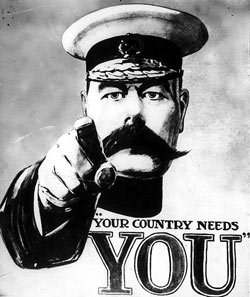The year 1917 was a very important year for WWI. The war was truly a “world war”, with fighting taking place in Europe, Africa and Asia
The Entrance of the United States
- Until 1917, the U.S. had maintained an “isolationist” position regarding WWI. This meant that they remained ISOLATED from
 participating in the conflict, choosing instead to remain NEUTRAL.
participating in the conflict, choosing instead to remain NEUTRAL. - They believed that WWI was a European conflict about European interests, and therefore they did not need to get involved.
- Over time, public opinion began to change as word came back about the German attack on neutral Belgium and innocent civilians being killed.
EVENTS THAT BROUGHT THE U.S. INTO THE WAR
I. The American government initially tried to remain “friends” with both sides of the conflict; however their ties with the Allies strengthened when there was financial motivation behind it: the American government lent the Allies $2 billion, and the American public purchased $2 billion in British and French war bonds. They now had a monetary interest in the Allies winning the war.
II. To defeat the British, the Germans relied on the use of UNRESTRICTED SUBMARINE WARFARE, vowing to sink any ship, armed or unarmed, military or civilian. This went against international law which required that unarmed/civilian ships not be sunk without providing for the safety of passengers and crews.
ð The use of unrestricted submarine warfare led to the sinking of the LUSITANIA in 1915. The Lusitania was a British passenger liner.
ð Nearly 1200 passengers drowned, including 128 Americans.
ð Some of the American public were outraged, and demanded that the American government retaliate, however President Wilson remained neutral.
ð Then, in 1916, the Germans torpedoed a French passenger ship called the SUSSEX, injuring several Americans on board.
ð President Wilson decided to issue a final warning to the Germans after this, demanding that the German government abandon Unrestricted Submarine Warfare or risk war with the United States.
ð The German government did not wish to strengthen the Allies by having the U.S. join the war on their side, so they agreed to:
- Compensate the Americans who were injured on the Sussex
- Not sink any more merchant/civilian ships without warning.
ð This was called the SUSSEX PLEDGE, which effectively kept the Americans out of the war a little longer.
ð By 1917, the Germans were facing defeat.
ð On February 3, 1917, they decided to resume unrestricted submarine warfare in order to defeat the British and the allies, announcing that all vessels in waters near Great Britain, France and Italy would be sunk without warning.
ð This was in direct violation of the Sussex Pledge, but the German government believed that even if it brought the Americans into the war, they would not be able to raise an army and transport it to Europe in time to prevent the Allies from collapsing.
ð Wilson responded by breaking off diplomatic relations with Germany.
III. THE ZIMMERMAN TELEGRAM
ð In January 1917, British intelligence intercepted and deciphered a telegram that was sent from German Foreign Minister Arthur Zimmermann to the German Minister to Mexico, von Eckhardt, offering United States territory to Mexico in return for joining the German cause.
ð In order to let anti-German sentiment rise in the United States, the British waited until February 24 and then passed this information on to the American government.
The American government could no longer remain neutral, and subsequently declared war on Germany on April 2, 1917.
The Exit of the Russians
- By 1917, Russia was on the verge of collapse. They had 1 – 2 million combat deaths, 2 – 3 million wounded, and up to 4,000,000 of their soldiers were prisoners of war.
ð The average Russian soldier was poorly trained and armed
ð Russian losses were extensive and morale declined; by early 1917, thousands of troops had deserted the Russian army
- Their gold reserves were nearly depleted, inflation soared, and they owed 8,000,000,000 rubles in war debt.
ð Civilians were protesting in the streets demanding an end to the war.
ð Strikes were held to protest the poor economic situation.
- Different groups were looking for the Czar (the emperor) to abdicate (give up) his throne
ð The Czar was forced to abdicate in February, 1917, and a provisional government was established.
ð The provisional government faced many challenges once in power:
- Heavy military losses were being suffered on the front.
- The soldiers were dissatisfied, demoralised and had started to defect. (On arrival back in Russia, these soldiers were either imprisoned or sent straight back into the front.)
- There was enormous discontent with Russia’s involvement in the war, and many were calling for an end to it.
- There were great shortages of food and supplies, which was difficult to remedy because of the wartime economic conditions.
- Other political groups were trying to undermine it, including the Bolshevik (communist) party. Their leader was Vladimir Lenin.
- Lenin promised to take the Russians out of the war, promising them “peace, land, and bread”
ð Lenin called for a revolution, and in November 1917, led a revolt against the Provisional government. With his win, he declared Russia a Communist state, and immediately negotiated a peace treaty with Germany.
- The talks dragged on and Germany threatened a deep invasion of the Ukraine and Russia if a treaty wasn’t signed.
- Finally on March 3, 1918, Russia and Germany signed the Treaty of Brest-Litovsk ending the fighting.
- The terms of the treaty were harsh for Russia, with Russia losing a lot of fertile land/territory, but the treaty was annulled when Germany surrendered to the Allies in November 1918.

It’s much useful and practically unknown information in Russia. Besides, no one knows here in Russia that Treaty of Brest-Litovsk led to enormous reparations from Russia, Russia which Germany declared the war.